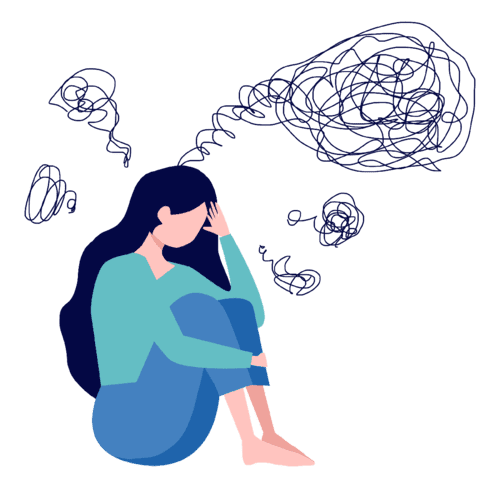High Functioning OCD Assessment
Free High Functioning OCD Assessment

What is High Functioning OCD Assessment?
High-functioning OCD assessment involves evaluating individuals for obsessive-compulsive disorder (OCD) symptoms that may not severely impair daily functioning but still cause distress. It assesses the presence of obsessions (intrusive thoughts) and compulsions (repetitive behaviors) that may be subtle or well-concealed. The assessment considers the impact of these symptoms on various areas of life, such as work, relationships, and overall well-being. Professionals use standardized tools, clinical interviews, and observations to diagnose and tailor interventions. Treatment strategies often include cognitive-behavioral therapy (CBT) and medication to alleviate distress and enhance functioning for individuals with less overt but still significant OCD symptoms.
Who can benefit from this High Functioning OCD Assessment?
The High Functioning OCD Assessment can benefit individuals who exhibit signs of Obsessive-Compulsive Disorder (OCD) but manage to maintain a relatively high level of functioning in daily life. This assessment is particularly valuable for those who experience subtle yet distressing obsessions and compulsions that might not be immediately apparent to others. It helps identify underlying OCD symptoms, guiding individuals towards appropriate interventions such as therapy, medication, and coping strategies. Early detection and tailored support can prevent escalation of symptoms, improve overall well-being, and aid those who might not otherwise seek help due to their functional facade.
High Functioning OCD Assessment Accuracy
Assessing high-functioning OCD’s accuracy requires comprehensive evaluation by mental health professionals. They consider obsessive thoughts’ impact on daily life, hidden rituals, distress tolerance, and functional impairment. It’s essential to delve beyond external appearances, recognizing internal struggles. Accurate assessment guides tailored treatment, combining therapy (like ERP) and, if needed, medication. Open dialogue and collaboration between patient and professional enhance understanding and guide effective interventions for managing high-functioning OCD’s challenges.
Types of High Functioning OCD Assessment
Clinical Interviews:
A thorough clinical interview is often the first step in assessing high-functioning OCD. A trained mental health professional will ask questions about the individual’s symptoms, their impact on daily life, duration, triggers, and any co-occurring conditions.
Diagnostic Criteria Evaluation:
The mental health professional will assess whether the individual’s symptoms meet the diagnostic criteria for OCD as outlined in the Diagnostic and Statistical Manual of Mental Disorders (DSM-5).
Self-Report Questionnaires:
Various self-report questionnaires and scales can help quantify the severity of OCD symptoms. Examples include the Yale-Brown Obsessive Compulsive Scale (Y-BOCS), Obsessive-Compulsive Inventory-Revised (OCI-R), and the Dimensional Obsessive-Compulsive Scale (DOCS).
Structured Interviews:
Structured interviews, such as the Structured Clinical Interview for DSM Disorders (SCID), provide a standardized way of assessing mental health conditions, including OCD. These interviews ensure consistency in assessment across different clinicians.
Functional Assessment:
This assessment focuses on how OCD symptoms impact different areas of an individual’s life, including work, relationships, social activities, and daily functioning.
Co-Occurring Conditions Screening:
Since other mental health conditions can often coexist with OCD, a comprehensive assessment may include screening for conditions like anxiety disorders, depression, and attention-deficit/hyperactivity disorder (ADHD).
Handling High Functioning OCD Issues
Handling high-functioning OCD can present its own set of challenges, as individuals with this type of OCD often appear outwardly successful while dealing with significant internal struggles. Here are some strategies to manage high-functioning OCD:
- Acknowledge the Condition: Recognize that you have OCD and that your struggles are valid, even if they are not immediately apparent to others. Acceptance is the first step toward managing your condition effectively.
- Seek Professional Help: Consider working with a therapist who specializes in treating OCD. Cognitive Behavioral Therapy (CBT), especially Exposure and Response Prevention (ERP), is particularly effective for managing OCD symptoms. Your therapist can help you tailor strategies to your high-functioning context.
- Set Boundaries: High-functioning individuals might have a tendency to overcommit due to their desire to appear “perfect” or accomplished. Learn to set healthy boundaries and prioritize self-care to prevent burnout.
- Practice Self-Compassion: Be kind to yourself and recognize that no one is perfect. Allow yourself to make mistakes and accept that imperfections are a natural part of being human.
- Mindfulness and Meditation: Practice mindfulness techniques to stay present and reduce anxiety. Meditation can help you detach from intrusive thoughts and build a greater sense of calm.
- Prioritize Treatment: Even if you’re managing to function well on the surface, addressing your OCD is important for long-term well-being. Regular therapy sessions and consistent use of therapeutic techniques are essential.
- Challenge Perfectionism: OCD often feeds into a desire for perfection. Work on challenging the idea that everything must be flawless, and learn to embrace imperfections.
- Practice Exposure: Gradually expose yourself to situations that trigger your OCD, and resist the urge to perform compulsions. This can help desensitize you to anxiety triggers and reduce the power of obsessions.
- Cultivate Flexibility: High-functioning individuals might struggle with rigidity. Practice being open to uncertainty and learning to tolerate discomfort.
- Healthy Coping Mechanisms: Develop healthy coping mechanisms to replace compulsions. Engage in activities that bring you joy and help manage stress.
- Educate Others: If you feel comfortable, educate close friends, family members, and colleagues about your condition. This can help foster understanding and create a supportive environment.
- Monitor Stress Levels: Pay attention to your stress levels and recognize signs of burnout. Implement stress-reduction techniques and take breaks when needed.
- Medication Options: If recommended by a psychiatrist, consider medication options that can help manage the anxiety and obsessions associated with high-functioning OCD.
Remember that everyone’s journey with OCD is unique. What works for one person might not work exactly the same for another. Be patient with yourself, and don’t hesitate to seek professional guidance when needed. A therapist can help tailor strategies to your specific situation and help you develop a personalized plan for managing high-functioning OCD.

